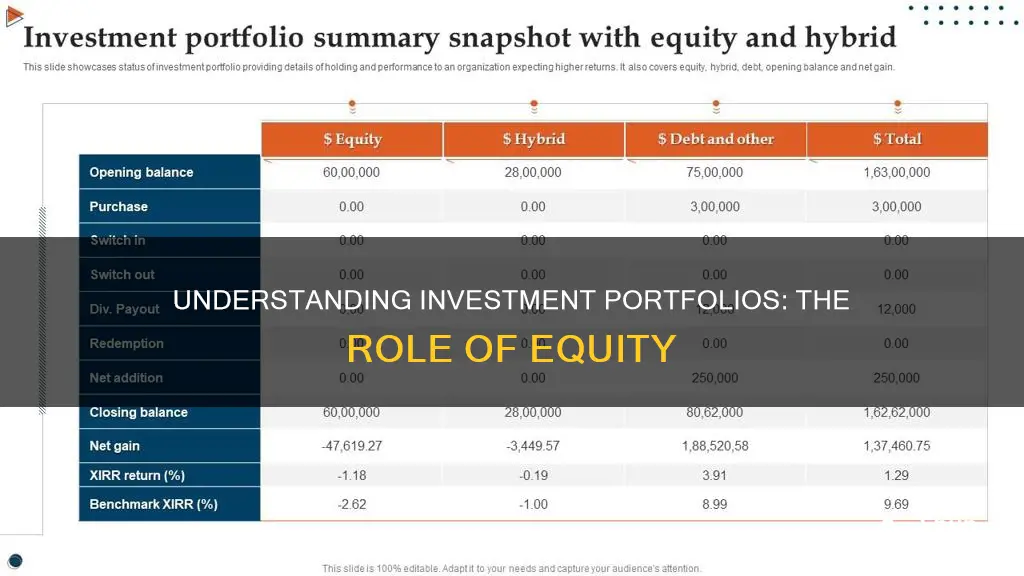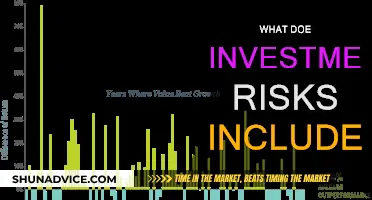
Equity is a significant component of investment portfolios. It represents the ownership interest in a company or asset, calculated by subtracting liabilities from the value of its assets. In the context of a company, equity is often referred to as shareholders' equity, representing the amount of money that would be returned to shareholders if all assets were liquidated and debts paid off. Equity investments are made by purchasing shares of a company, typically on a stock exchange, with the expectation of capital gains or dividends. Equity funds, managed by professionals, offer investors a diversified approach to investing in stocks, providing the potential for attractive long-term returns. Portfolio managers play a crucial role in equity portfolio management, ensuring that individual portfolios perform well and align with the specific style and constraints of the investment firm.
| Characteristics | Values |
|---|---|
| Definition | Equity is an ownership interest in property that may be offset by debts or other liabilities. |
| Calculation | Equity = Total Assets – Total Liabilities |
| Investment Objective | Investors seek equity investments as they provide a greater opportunity to share in the profits and growth of a firm. |
| Benefits | Capital appreciation, dividend income, diversification with other asset classes, and a potential hedge against inflation. |
| Considerations | Risk objective, return objective, liquidity requirement, time horizon, tax concerns, legal and regulatory factors, and unique circumstances. |
| Segmentation | Size and style, geography, and economic activity. |
| Income Sources | Dividends, securities lending fees and interest, dividend capture, covered calls, and cash-covered puts. |
| Costs | Management fees, performance fees, administration fees, marketing/distribution fees, and trading costs. |
| Portfolio Management | Requires attention to detail, software skills, and administrative efficiency. |
What You'll Learn

Equity funds and diversification
Equity funds are a type of investment fund that pools money from investors to buy a portfolio of stocks, also known as equity securities. They offer a professionally managed, diversified approach to investing in stocks, with the potential for attractive long-term returns.
Types of Equity Funds
Equity funds can be actively or passively managed. Actively managed funds have portfolio managers who actively research, analyse and select stocks with the goal of outperforming a benchmark index, such as the S&P 500. The success of these funds largely depends on the fund manager's skill and decision-making ability. Passively managed funds, on the other hand, include index funds, which aim to replicate the performance of a specific market index. Passive fund managers do not attempt to outperform the market; instead, they track the index as closely as possible.
Equity funds can also be categorised by market capitalisation, or market cap, which is the total market value of a company's outstanding shares. Large-cap funds invest in stocks of large companies, typically with a market capitalisation exceeding $10 billion. Mid-cap funds invest in companies with a market capitalisation between large and small-cap, while small-cap funds buy stocks of smaller companies, typically with a market capitalisation under $2 billion.
Benefits of Equity Funds
Equity funds offer investors several benefits, including diversification, professional management, and the potential for superior returns.
Risks of Equity Funds
However, it's important to understand the risks associated with equity funds. The main one is market risk, which refers to the potential impact of economic downturns, geopolitical events, or changes in investor sentiment on stock prices. During periods of market turbulence, equity fund prices can fluctuate significantly, potentially leading to short-term losses for investors.
Choosing the Right Equity Fund
When choosing an equity fund, it's essential to assess your risk tolerance, time horizon, and financial goals. For example, if you're a young investor with a long time horizon and a high-risk tolerance, you may consider investing in an actively managed small-cap growth fund. On the other hand, if you're nearing retirement and prioritising income generation and capital preservation, a large-cap value fund focusing on mature, dividend-paying companies may be more suitable.
Diversification
Diversification is a key investment strategy that helps to reduce risk and enhance returns. By investing in a wide range of stocks across different sectors and industries, equity funds reduce the impact of any single stock's performance on the overall portfolio. This diversification also lowers the unsystematic risk associated with investing in individual stocks, as the success or failure of one company has a limited effect on the fund as a whole.
Additionally, equity funds can provide diversification across different asset classes, geographic regions, and market sectors. For example, sector funds focus on a particular segment of the economy, allowing investors to concentrate their exposure to a specific area of the market. Geographically focused funds, also known as regional funds, invest in stocks of companies based in certain areas of the world, offering diversification across different countries or regions.
Overall, equity funds offer a convenient way to gain exposure to a diversified portfolio of stocks, providing the potential for higher returns than more conservative investments. However, it's crucial to carefully consider your investment objectives, risk tolerance, and time horizon before investing in equity funds.
Savings Strategies: Where to Invest for Maximum Returns
You may want to see also

Shareholder equity
> Shareholder Equity = Total Assets – Total Liabilities
Creating Investment Portfolio Projections: A Comprehensive Guide
You may want to see also

Active vs passive equity funds
Equity in an investment portfolio refers to the ownership stakes in businesses that an investor holds. These stakes, often referred to as shares or stock, represent a claim on the assets and profits of the companies in which they are invested. An investment portfolio is a collection of financial assets, including stocks, bonds, cash, and other investment types, held by an individual or institution. Equity, in this context, specifically pertains to the portion of the portfolio comprised of stocks.
When individuals invest in a company's equity, they become part owners of that business and are entitled to a proportionate share of its profits, typically distributed as dividends. Over time, the value of these equities may appreciate, leading to capital gains for investors. Equities are typically considered a crucial component of a well-diversified investment portfolio, offering the potential for long-term growth and wealth accumulation.
Active vs. Passive Equity Funds:
Now, let's delve into the comparison between active and passive equity funds:
Active Equity Funds:
Active equity funds are investment portfolios actively managed by professional fund managers who aim to outperform a specified benchmark index. These fund managers use their expertise and research to select individual stocks that they believe will appreciate in value and generate strong returns for the fund. The primary objective of active fund managers is to generate alpha, which refers to returns that exceed the market average or the designated benchmark.
Active fund managers employ various strategies, such as fundamental analysis, technical analysis, or a combination of both, to identify undervalued stocks or those with strong growth potential. They may also engage in market timing strategies, attempting to buy and sell stocks at opportune moments to capitalize on market movements. The level of success in active fund management depends on the skill and expertise of the fund manager and the effectiveness of their research and strategies.
Passive Equity Funds:
On the other hand, passive equity funds, often known as index funds, seek to replicate the performance of a particular market index, such as the S&P 500 or the Nasdaq Composite. Unlike active funds, passive funds do not aim to outperform the market but rather to match the returns of the specified index as closely as possible. Passive fund managers do not attempt to pick individual stocks or time the market. Instead, they invest in the same securities that comprise the index, mirroring its performance, weighting each security according to its representation in the index.
Passive equity funds offer investors a more cost-effective option, as they generally have lower expense ratios than active funds. This is because passive funds require less active management, reducing the need for extensive research and analysis. By tracking a broad market index, passive funds provide investors with instant diversification and broad market exposure, ensuring that they capture the overall market performance, including its ups and downs.
Choosing Between Active and Passive Equity Funds:
The decision between investing in active or passive equity funds depends on various factors, including an investor's risk tolerance, investment goals, and beliefs about market efficiency. Active funds may be more suitable for investors seeking the potential for higher returns and who are willing to accept the additional risk that comes with attempting to beat the market. On the other hand, passive funds offer a more hands-off approach, providing broad market exposure and reducing the risk associated with individual stock selection. They are often favored by investors who believe that it is challenging to consistently outperform the market and that lower costs associated with passive investing can lead to better long-term returns.
In conclusion, the choice between active and passive equity funds is a fundamental decision that investors need to make when constructing their investment portfolios. Both strategies have their advantages and considerations, and investors should carefully evaluate their preferences, investment horizons, and market expectations before deciding which approach aligns better with their financial objectives.
I hope that was helpful! Is there anything else I can assist you with?
Demand-Supply Equilibrium: Savings, Investments Balance
You may want to see also

Equity portfolio management
Equities often represent a primary component of investors' portfolios. They can provide several benefits, including capital appreciation, dividend income, diversification with other asset classes, and a hedge against inflation. The inclusion of equities in a portfolio is often driven by a client's goals and needs, with portfolio managers considering various investment objectives and constraints, such as risk and return objectives, liquidity requirements, time horizons, tax concerns, and legal and regulatory factors.
There are several mechanical elements to portfolio management that must be learned before constructing and running equity portfolios. Building a portfolio model is a common aspect of equity portfolio management. A portfolio model serves as a standard against which individual portfolios are matched. Portfolio managers assign a percentage weighting to each stock in the model, and then individual portfolios are adjusted to match this weighting. This allows for efficient management of multiple portfolios, ensuring they perform well and in a homogeneous way.
Portfolio managers working for investment management companies typically must adhere to the firm's general investment philosophy and may have strictly defined parameters for stock selection and asset management. They may also be constrained by market capitalization guidelines, with small-cap managers, for example, limited to selecting stocks in a specific market cap range. Additionally, there may be a "house style" in selection vis-a-vis economic trends, with some managers using a bottom-up approach, while others are top-down oriented, considering macroeconomic trends and sectors.
Understanding tax consequences is crucial in portfolio management. Non-taxable portfolios, such as those for retirement or pension funds, provide more flexibility, while managers of taxable portfolios must consider various factors to minimise taxable events.
Build a Secure Investment Portfolio Through Duration Matching
You may want to see also

Equity income and costs
Equity income refers primarily to income derived from stock dividends, which are cash payments made by companies to their shareholders as a reward for investing in their stock. These payments can be accessed by owning dividend-paying stocks or funds. Stocks are the most common type of equity income investment. Companies generally pay dividends when they have limited investment opportunities and excess cash available, serving as a way to reward shareholders, attract investor capital, and support their share prices.
Equity income is often sought by more conservative investors looking for long-term income. These investors should consider the dividend yield of stocks or funds, as well as the potential for sustainable and growing payouts. Dividend reinvestment programs and the tax implications of equity income are also important considerations.
Income-paying companies tend to be large, well-established, and committed to paying dividends to shareholders. These companies, often called "blue chips", are usually mature in terms of revenue and earnings. Examples include the 30 blue-chip stocks that make up the Dow Jones Industrial Average, some of which pay lucrative dividends.
Mutual funds and exchange-traded funds (ETFs) can also be managed with a focus on equity income, investing in dividend-paying stocks. Vanguard, for instance, offers some of the best dividend-paying funds for a relatively low expense ratio.
The dividend yield of an equity income investment is a crucial characteristic for investors. Stocks and funds will have a trailing and forward dividend yield that helps investors gauge the payout as a percentage of the price. However, successful income investing involves more than just hunting down the highest yields.
Investors should also be mindful of the tax implications of equity income. Taxes must be paid on equity income received from stock and fund investments, regardless of whether the distributions are reinvested.
Equity Costs
Equity funds generally carry higher risk compared to income funds due to the volatility of the stock market. Actively managed equity funds can also charge high fees. Additionally, investors have no control over the fund's portfolio, which can be a disadvantage.
When considering equity funds, it is important to assess the fund's performance using metrics such as alpha, benchmarks, Sharpe ratio, total returns, and volatility. While equity funds offer the potential for higher returns, they also come with greater risk.
Savings and Investment Spending: Friends or Foes?
You may want to see also
Frequently asked questions
Equity in an investment portfolio refers to the ownership of shares in a company or business entity. It represents the value of an investor's stake in the company, which can be calculated by subtracting the company's total liabilities from its total assets. Equity investments are typically made with the expectation of capital gains and/or dividends.
Equity is important because it represents the potential for investors to share in the profits and growth of a company. It offers the opportunity for capital appreciation, dividend income, diversification, and a hedge against inflation. Equity investments also provide investors with voting rights and the ability to influence management decisions.
The main risk associated with equity investments is market risk, which includes economic downturns, geopolitical events, and changes in investor sentiment. Other risks include credit risk, foreign currency risk, liquidity risk, political risk, economic concentration risk, and inflation risk. Additionally, equity investments may have high management fees and tax implications.







